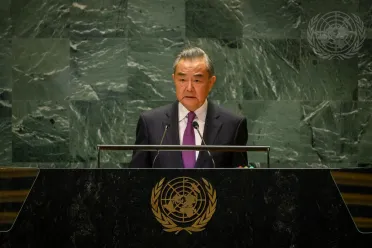Statement
Statement summary
WANG YI, Minister for Foreign Affairs of China, said that, today, “humanity has once again come to a critical crossroad”, facing a turbulent world where security challenges, imbalanced development and ineffective governance are increasingly prominent. With emerging hotspots of conflicts and geopolitical tensions, the future of this planet has become a cause of concern. Concurrently, he observed, “the aspirations of the Global South nations for modernization have never been stronger”. Noting that the UN embodies people's aspirations worldwide for lasting peace and shared prosperity, he stressed that the Organization’s role should be strengthened. Accordingly, he underscored the need to implement a security architecture that ensures enduring stability, fosters a development paradigm of prosperity and adopts an approach to civilizations that promotes mutual learning. He also called for “a new type of international relations characterized by mutual respect, fairness, justice and win-win cooperation. In today’s world, the security of all countries is intertwined and “no one can enjoy security alone”, he said, noting that countries must be guided by common security and respect each other’s sovereignty and territorial integrity.
“Achieving modernization is the legitimate right of the people of all countries, not a prerogative of a few,” he continued, advocating for inclusive economic globalization. To this end, he underscored the need to oppose unilateralism and protectionism and help developing countries leap over the developing divide. It is vital to strive to replace the clash of civilizations with mutual learning and reject ideology-based confrontation. All countries — regardless of their size — have their place in a multipolar system, he asserted, opposing hegemonism and power politics. Noting that “an end to the Ukraine crisis remains elusive”, he urged de-escalation and reiterated Beijing’s commitment to promoting peace talks. The question of Palestine is “the biggest wound to human conscience,” causing more casualties with each passing day, he said, emphasizing that “there must be no delay in a comprehensive ceasefire”.
He further underscored that the Korean Peninsula should not experience war again, calling for persistent efforts for de-escalation. “Asia has the wisdom and capability to stabilize the situation,” he stated, noting that China has never opted to be an indifferent spectator. Instead, it has played a more significant part in global governance than ever before. Stressing that sanctions and pressure will not bring monopolistic advantages and suppressing and containing others will not solve problems at home, he urged the United States to completely lift its blockade of and sanctions against Cuba. He further emphasized that Taiwan is an integral part of China’s territory, reiterating that the Cairo Declaration stated explicitly that all the territories Japan had stolen from the Chinese should be restored to his country. “There is no room for ambiguity,” he asserted, adding that “the complete reunification of China will be achieved, and Taiwan will eventually return to the embrace of the mother.” And “no force can stop it”, he added.
Wang Yi, the Foreign Minister of China reiterated on Saturday his country’s commitment to playing a constructive role and engaging in mediation for peace, not exploiting volatile situations for “selfish gains”.
*****
To that end, China, jointly with Brazil and other countries of the Global South, launched a Group of Friends for Peace, he said in his address the UN General Assembly.
“Its very purpose is to uphold the purposes and principles of the UN Charter, build consensus for a political settlement of the crisis and contribute to a prospect of peace,” the Minister said.
He noted that the question of Palestine is the “biggest wound” to the human conscience.
The ongoing conflict in Gaza is causing more casualties with each passing day, he said, adding that fighting has started again in Lebanon.
“But might cannot replace justice. Palestine’s long held aspiration to establish an independent state should not be shunned anymore, and the historical injustice suffered by the Palestinian people should not be ignored anymore.”
The Foreign Minister also noted China’s partnerships with African nations as well as with some least developed countries (LDCs), while highlighting its opposition to unilateral coercive measures, such as sanctions and blockades, and disruption of supply chains.
“Sanctions and pressure will not bring monopolistic advantages. Suppressing and containing others will not solve problems at home. The right of people of all countries to pursue a better life should not be taken away,” he said, calling on the United States to completely lift its blockade, sanctions and terrorism related designation against Cuba.
Mr. Wang also emphasized China’s commitment to a “path of green, low-carbon, and sustainable development”.
“We will move from carbon peaking to carbon neutrality in the shortest time span in world history, contributing China’s efforts to harmonious coexistence between humanity and nature at the global level,” he said.
He also highlighted that the principle of common but differentiated responsibilities must be upheld, and that the Paris Agreement on climate change must be implemented in earnest.
Developed countries should also assist developing nations in building their capacity to cope with climate change, he added.
Foreign Minister Wang further highlighted China’s support for UN reform and modernization, as well as for international financial systems to be fit for current times. China would also continue fulfil its obligations, providing financial support and qualified human resources.
He urged the Organization to “respond to the legitimate calls” of developing countries and increase the representation and voice of those in the Global South.
Concluding his address, Mr. Wang said next year will mark the 80th anniversary of end of World War II and the founding of the United Nations.
“China stands ready to work with all countries to renew the founding purposes and mission of the UN, reaffirm our steadfast commitment to the UN Charter, advocate and practice true multilateralism, build a community with a shared future for mankind, and jointly usher in a better world.”

